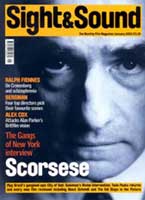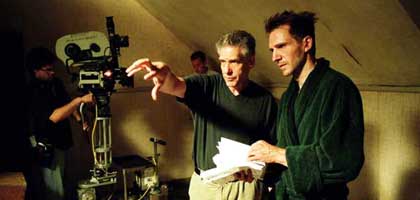
The Right Trousers

Nick James talks to Ralph Fiennes abouts his experiences filming 'Spider'
Nick James: Have you ever played a role that's similar to Spider in terms of the absence of language?
Ralph Fiennes: I've tended to play parts that have a lot of intricate dialogue - my roles in Sunshine, The English Patient or The End of the Affair for instance. Here I found it quite freeing to have my mind left clear to enjoy the physicality. With Spider it's as if there's a monologue going on within him all the time which you can hear only in little murmurs. I found Samuel Beckett's writing very helpful as a key to the character. Those bits in Malone Dies where he's moving stones from the left pocket to the right pocket and the obsessional details about how his legs feel. Both David and I used Beckett as a key, not just his writing but his face. I had my hair cut like his - that short crop at the back.
In stage acting there's a lot of concern with phraseology and rhythm. Did this semi-mute role recall a different part of your training?
I wanted to be an actor because I've always loved handling classical language. I've trained a bit of my head to be constantly aware of how I'm phrasing things. Yet the more acting I've done, the more I believe that while it's good to have that awareness, it's also good to lose it. You can be too caught up in positioning words for an audience to hear and understand.
Was there a lot of physical preparation?
We spent a lot of time choosing the clothes - which sounds odd, because they're very dreary and nondescript. We went looking with David's sister Denise, who acted as costume designer, and they both understood the need to find exactly the right trousers that were too short in just the right way. I had four shirts and the sequence of the shirts was important. We had no repeats so it wasn't like you had two versions of a set of clothes in case something happens; there was only one. We washed them but they were never ironed. I had to ask one of the wardrobe people to regrime the collars. So I became very attached to the shirts and I think the physicality emerged in part through the clothes.
The design department asked me what sort of things you would see in Spider's suitcase and they got loads of stuff. Initially it was all too artful: leaves wrapped with string and tied like a piece of artwork and David and I agreed they were too self-conscious. They needed to be rougher, just bottle tops, bits of string. I collected more things when we were shooting - I would walk along beside the canal and pick up real stuff and my pockets soon became full of Spidery things.
We didn't have any rehearsal. On the first day I simply tried it out. The first shot was the long approach to Mrs Wilkinson's house down the street. I kept on saying to David, "Does that seem right?" David's very economical; he doesn't give long involved directions. If anything, you have to push him.
How close were you and David in what you had in mind?
Unlike someone like István Szabó, who wants to sit down and go through everything - and I quite like that attention from a director taking you through every beat of a part - David is easygoing. I had to ask, "David, can we meet and talk about it?" and he said, "Sure, we'll meet", and so we met. But if I hadn't asked, would we have met? He's one of those directors who once he thinks the actor's right for the part, assumes you'll get on with it. Then if there's a wrong note, he'll say so.
One of the things they say about schizophrenics is that it's normal to see their limbs moving a lot. Once when I'd been doing Spider for a number of weeks I found myself doing something with my leg, something I'd never done before. David said, "What are you doing that for? That's not Spider. Leave it." So then I thought, "Oh well, he's really watching."
The shots are a lot longer than in many of the films you've made.
If the cinema audience was inside Spider's head at times it would be the craziest, freakiest, scariest thing. So the rhythm I was creating for him was slow by most people's standards because I think he's negotiating all these voices. Every moment and every thing has a life or is a possible threat to him - even the handles on the cupboard doors. I'm told that for schizophrenics the turning of a handle can be a huge decision because there might be some threat behind it. So I just imagined that everything - the lights in the room, the sound of the air conditioning - contained unknown things that were possibly dangerous. David allowed scenes to play out, so if it took me ten seconds instead of five to walk across a corridor he would shoot ten seconds. He said, "If that's Spider, then that's what we're going to film."
Aside from Beckett it also reminded me of the England of Patrick Hamilton's novels.
You can't smell film but you know the smell of those pubs, the cigarettes and the beer stains. In Patrick McGrath's book Spider is put away in the 1930s and emerges in the 1960s. I thought for the film, before David came on board, that he should be put away as a boy in the early 1960s and come out in the present. But when David got involved he didn't agree. He wanted a generic London in which we don't know quite where or when we are. There are little moments of the present, though, like when Spider arrives at the house and the mother comes out with the babywalker and she's wearing jeans.
It's still possible to have that kind of time slip in parts of the real East End.
One of Patrick's visual references was Bill Brandt's photographs of the pubs and the prostitutes - there's one picture of a woman in a bar which formed the inspiration for Yvonne. I don't usually see rushes but I like to watch them initially to get a sense of how things are looking and I was really excited by what Peter Suschitzky was doing. I love the way some of the interiors are lit, the way pieces of furniture take on a resonance. Everything I do or Miranda does is supported by how we're photographed. So the sense of loneliness isn't just me feeling alone - it's created by how the scene was shot.
Did you get into any Method-style routines with objects? For instance, did you tie up the string in your room?
No, but I wrote my book of hieroglyphics and I selected all the things that are in my suitcase and I went around the streets picking up bits and pieces for what I thought Spider should have. I'm not the kind of actor who's in character 24 hours a day, but I remember being very affected by how the clothes felt. Having no language, it became about the sensation of being Spider, and maybe that made me more concentrated on the state of being than I've been before. Sometimes I think you just assume the dialogue contains the information for the character. With Shakespeare everything is in the language, and if you start to do too much stuff aside from the language it stops working. Here it's the opposite.
It's a sombre film, but was it a sombre film to make?
I sensed that everyone on the crew had an affection for Spider and everyone got to know his quirks and mannerisms and mutterings. People who are passionate about making films are thrilled when something like this gets made, because it's so hard to get films that aren't designed for a commercial market off the ground. So the atmosphere from everyone involved was good. People didn't get paid for a long time - they did a lot of it out of goodwill.
How did you get involved?
Producer Catherine Bailey had developed the script with Patrick. I read it four years ago and liked it immediately. But it was difficult to find a director and very hard to finance - even with David's name attached it was still a problem.
What was the final piece of the jigsaw that got it made?
We were saved! Catherine thought she had financing from a group which then turned round when we were already in pre-production and said it didn't have the funds. Then Capitol Films came in and saved us. They negotiated quite a tough deal, but they made it possible. It was one of those films where people who see the script say "It's too dark" then once it gets a momentum and a director is there it has another reality.
Do you like to get involved as a producer?
I did it with my sister for Onegin - it was fantastic but very hard. I became very aware of the backstage mechanics, of when the weather's bad or the crew are on overtime. On a big-budget film like Red Dragon it doesn't really matter but on a film like Spider you're very aware of the hours. People try to protect the actors but I could tell that every day was a knife edge.
Did you meet people like Spider?
I did. David didn't want to get bogged down in how accurately we were portraying schizophrenia, but I decided I at least wanted to meet some people who were suffering from the condition. So I met people who are seriously affected and are quite articulate and can talk about it openly. I haven't based Spider on any one person, just a mix - there's an aspect of one old man I met, for instance. But I also had a strong sense of him from Patrick's book and from one of the doctors working in an outpatients' hospital in Croydon. It was all about getting people suffering from schizophrenia to cope with living and working in the community and how they can adjust to living a normal life. I met some of the outpatients, who were very open with me. I told them exactly what I was doing and they all gave their consent to meet me so they're in no danger of exploitation or voyeurism.
'Spider' opens on 3 January 2003.
